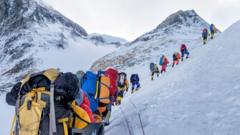Starting in September, the price for climbing Mount Everest will see a significant increase, as Nepal's government has announced a hike in permit fees for climbers. The new fee will set climbers back $15,000 (£12,180), marking a 36% rise from the longstanding permit cost of $11,000.
Those planning to attempt the peak during off-peak months will also see increased fees, with climbing from September to November now costing $7,500, and $3,750 from December to February. These fees play a crucial role in Nepal's economy, with climbing and trekking contributing over 4% to the nation's revenue.
However, many mountaineering experts have voiced their concerns regarding overcrowding facilitated by the large number of permits issued annually—approximately 300. This new fee increase has been under consideration for quite some time, but it remains uncertain whether it will influence overall demand for climbs.
Narayan Prasad Regmi, director general of the Department of Tourism, acknowledged that the royalty or permit fees had not seen adjustments in many years, stating, "We have updated them now," although he did not outline specific plans for the additional revenue.
British mountaineer Kenton Cool, who has summited Everest 18 times, noted that these fee changes are expected and perhaps won’t deter serious climbers, emphasizing that it is critical for the additional funds to be allocated wisely.
In April 2024, Nepal's Supreme Court issued preliminary orders for the government to impose limits on the number of climbing permits granted for Everest and other high peaks, citing that the mountains' carrying capacity needs attention.
Concerns over climber congestion, particularly hazardous situations where climbers are queuing to reach the summit, triggered the Nepalese army to initiate an annual clean-up operation beginning in 2019. Reports indicate that over five clean-up efforts have removed 119 tonnes of refuse, alongside recovering 14 bodies and some skeletal remains. Estimates suggest that approximately 200 bodies remain on the mountain, fostering an ongoing dialogue about the ethics and safety of climbing Everest.
Nepal, home to eight of the world's fourteen tallest peaks including Everest, faces a critical period as the ramifications of these changes unfold amidst rising concerns over environmental stewardship and climber safety.






















